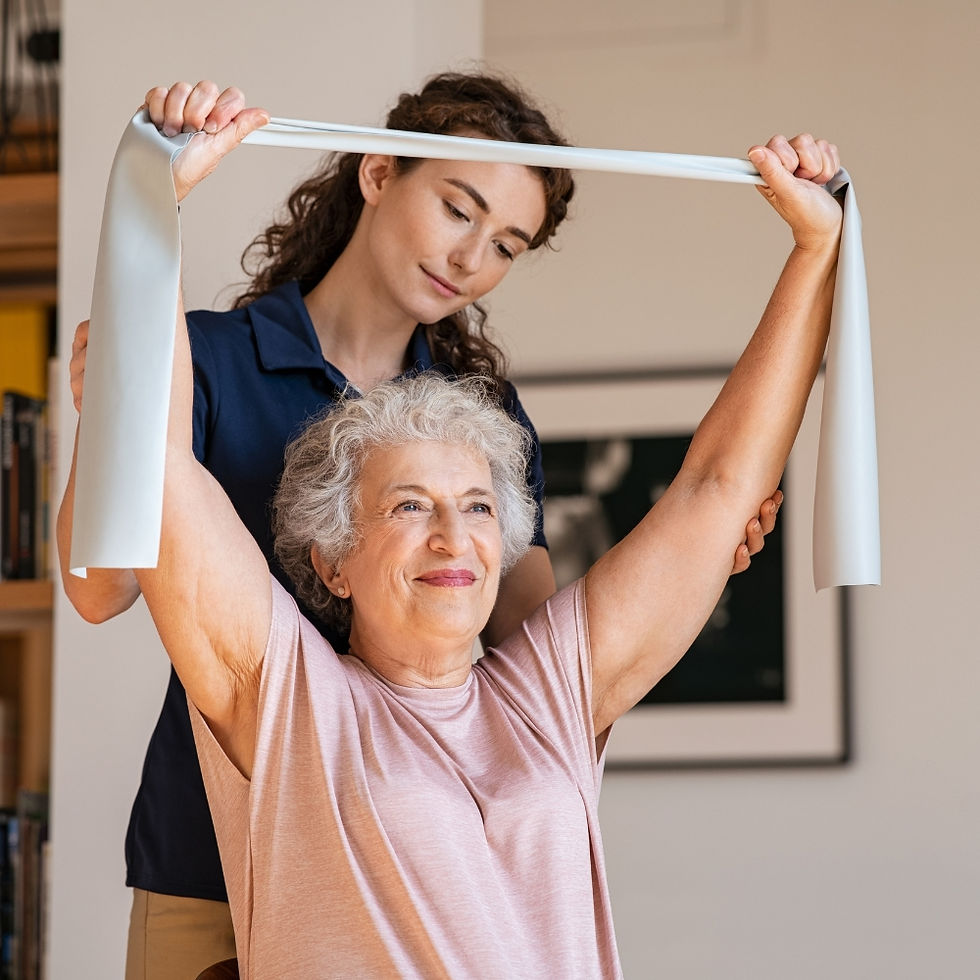What Are The Benefits of Physiotherapy for Older Adults
- Tim Rickard
- Jul 28, 2025
- 3 min read
As we age, maintaining mobility, independence, and overall quality of life becomes increasingly important.
This article will explore how physiotherapy for older adults can play a key role in managing pain, improving balance and enhancing strength and flexibility to maintain an independent lifestyle.

How Does Physiotherapy Work?
Physiotherapy begins with a thorough assessment by a trained physiotherapist, which can be accessed through a referral from your GP or by seeking private physiotherapy services.
Either way, a physiotherapist will check your mobility, strength and overall physical health. Based on their findings, the physiotherapist will create a treatment plan tailored to your needs.
This may include simple exercises you can do at home to build your strength and flexibility, hands-on therapy to alleviate pain and stiffness and guidance on proper posture and safe movement, with the primary purpose of helping you stay active, safe and in control.
6 Benefits of Physiotherapy for Older Adults
Improves Mobility and Balance
Ageing can often lead to a decrease in muscle mass, joint stiffness and slower reflexes, all of which can impact your daily movement and stability. A physiotherapist can use targeted exercises to strengthen muscles, increase joint flexibility and retrain balance responses.
These interventions can help reduce the risk of falling, which can lead to serious injury and a prolonged recovery, mentally and physically. Maintaining these exercises can help you regain your confidence in walking, climbing stairs, and performing various other daily activities, all of which contribute to your independence.

Aids in Recovery from Surgery or Injury
Physiotherapy plays a crucial role in speeding up recovery following surgeries like hip or knee replacements, or after sustaining injuries such as a fracture. A physiotherapist can help prevent complications like joint stiffness and muscle atrophy by guiding you through regular, gentle exercises, pain management techniques, and mobility training to regain strength and movement.
This focused rehabilitation not only improves outcomes but also reduces the potential of hospital readmissions. With the support of physiotherapy, you may return to your usual routines more quickly and with greater confidence, enhancing both your physical and emotional recovery.
Supports Neurological Conditions
Neurological conditions such as Parkinson’s disease, stroke, multiple sclerosis and hemiplegic migraines can significantly impact balance, coordination and muscle control. A physiotherapist can provide targeted interventions, including gait training, balance exercises and coordination drills, to manage these complex issues, thereby helping to improve posture and functional movements, enhancing the overall quality of your life.
Enhance Cardiovascular Health
As you get older, physical inactivity and age-related decline can contribute to reduced cardiovascular fitness, increasing the risk of heart disease, high blood pressure and other related conditions. To prevent this from occurring, you can incorporate physiotherapy with cardiovascular training through low-impact aerobic exercises, such as walking, cycling, or pool therapy, and tailor it to your specific needs. Not only do these exercises strengthen the heart and lungs, but they also improve circulation and boost endurance.
Sticking with a cardiovascular-focused physiotherapy program over time can lead to noticeable improvements, such as lower blood pressure, more stable blood sugar levels and increased energy in your daily life.

Help Alleviate Chronic Pain
As we age, chronic pain is often caused by arthritis, osteoporosis or old injuries. Since these chronic illnesses and pain already require medication, adding more isn’t ideal.
Physiotherapy offers a non-pharmaceutical strategy that can help relieve your chronic pain, improve function and reduce inflammation flare-ups. This includes techniques like therapeutic exercises, manual therapy, heat and cold application, as well as education on body mechanics.
Additionally, a physiotherapist will also teach pacing and coping strategies, encouraging you to manage your condition independently. By addressing the root causes of pain, whether that’s from a chronic illness or injury, you can improve your daily comfort and reduce your reliance on medications that carry unwanted side effects.
Improve Pelvic Floor Dysfunction
Pelvic floor dysfunction, including urinary incontinence and pelvic organ prolapse, affects many older adults, particularly women. Physiotherapy can offer you specialised treatment to strengthen your pelvic floor muscles, allowing you to improve your bladder and bowel control.
This personalised strengthening intervention, which is safe, discreet, and practical, will not only reduce embarrassing symptoms but also restore your confidence and improve your quality of life. With consistent therapy, you can expect to experience significant improvement or even complete resolution of your pelvic floor issue.
The Importance of Staying Active Over 50
Regular physical activity over 50 can help preserve your muscle strength, flexibility and balance, reducing the risk of falls and injuries. It can also support your heart health, help control your weight and lower the risk of chronic diseases such as diabetes, arthritis, and osteoporosis.
Beyond physical benefits, exercise is known for boosting mood, reducing stress and sharpening cognitive function. As the body ages, it naturally slows down; however, staying active through low-impact cardio, strengthening, and stretching exercises can help counteract this decline, ultimately leading to a better quality of life.




